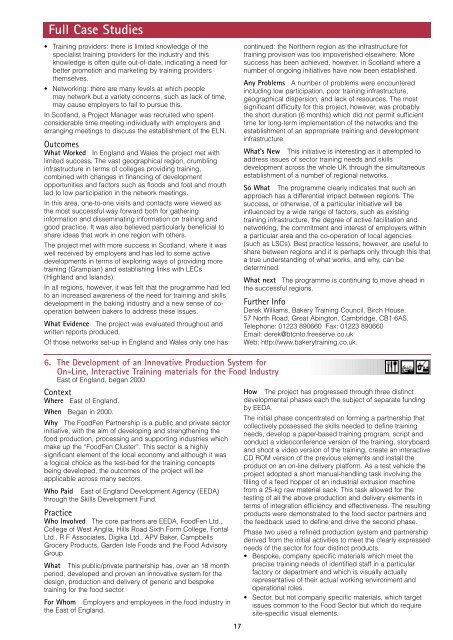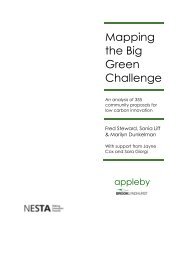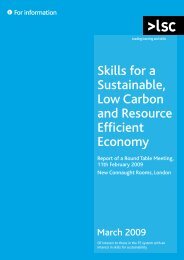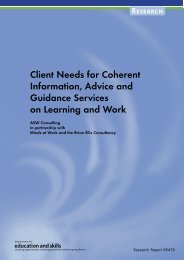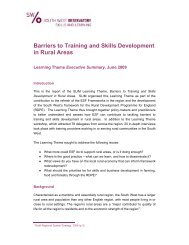Part 2 - The Skills & Learning Intelligence Module
Part 2 - The Skills & Learning Intelligence Module
Part 2 - The Skills & Learning Intelligence Module
Create successful ePaper yourself
Turn your PDF publications into a flip-book with our unique Google optimized e-Paper software.
Full Case Studies• Training providers: there is limited knowledge of thespecialist training providers for the industry and thisknowledge is often quite out-of-date, indicating a need forbetter promotion and marketing by training providersthemselves.• Networking: there are many levels at which peoplemay network but a variety concerns, such as lack of time,may cause employers to fail to pursue this.In Scotland, a Project Manager was recruited who spentconsiderable time meeting individually with employers andarranging meetings to discuss the establishment of the ELN.OutcomesWhat WorkedIn England and Wales the project met withlimited success. <strong>The</strong> vast geographical region, crumblinginfrastructure in terms of colleges providing training,combined with changes in financing of developmentopportunities and factors such as floods and foot and mouthled to low participation in the network meetings.In this area, one-to-one visits and contacts were viewed asthe most successful way forward both for gatheringinformation and disseminating information on training andgood practice. It was also believed particularly beneficial toshare ideas that work in one region with others.<strong>The</strong> project met with more success in Scotland, where it waswell received by employers and has led to some activedevelopments in terms of exploring ways of providing moretraining (Grampian) and establishing links with LECs(Highland and Islands).In all regions, however, it was felt that the programme had ledto an increased awareness of the need for training and skillsdevelopment in the baking industry and a new sense of cooperationbetween bakers to address these issues.What Evidence <strong>The</strong> project was evaluated throughout andwritten reports produced.Of those networks set-up in England and Wales only one hascontinued: the Northern region as the infrastructure fortraining provision was too impoverished elsewhere. Moresuccess has been achieved, however, in Scotland where anumber of ongoing initiatives have now been established.Any Problems A number of problems were encounteredincluding low participation, poor training infrastructure,geographical dispersion, and lack of resources. <strong>The</strong> mostsignificant difficulty for this project, however, was probablythe short duration (6 months) which did not permit sufficienttime for long-term implementation of the networks and theestablishment of an appropriate training and developmentinfrastructure.What’s New This initiative is interesting as it attempted toaddress issues of sector training needs and skillsdevelopment across the whole UK through the simultaneousestablishment of a number of regional networks.So What <strong>The</strong> programme clearly indicates that such anapproach has a differential impact between regions. <strong>The</strong>success, or otherwise, of a particular initiative will beinfluenced by a wide range of factors, such as existingtraining infrastructure, the degree of active facilitation andnetworking, the commitment and interest of employers withina particular area and the co-operation of local agencies(such as LSCs). Best practice lessons, however, are useful toshare between regions and it is perhaps only through this thata true understanding of what works, and why, can bedetermined.What next <strong>The</strong> programme is continuing to move ahead inthe successful regions.Further InfoDerek Williams, Bakery Training Council, Birch House,57 North Road, Great Abington, Cambridge, CB1 6AS.Telephone: 01223 890660 Fax: 01223 890660Email: derek@btcnto.freeserve.co.ukWeb: http://www.bakerytraining.co.uk.6. <strong>The</strong> Development of an Innovative Production System forOn-Line, Interactive Training materials for the Food IndustryEast of England, began 2000ContextWhere East of England.When Began in 2000.Why <strong>The</strong> FoodFen <strong>Part</strong>nership is a public and private sectorinitiative, with the aim of developing and strengthening thefood production, processing and supporting industries whichmake up the “FoodFen Cluster”. This sector is a highlysignificant element of the local economy and although it wasa logical choice as the test-bed for the training conceptsbeing developed, the outcomes of the project will beapplicable across many sectors.Who Paid East of England Development Agency (EEDA)through the <strong>Skills</strong> Development Fund.PracticeWho Involved <strong>The</strong> core partners are EEDA, FoodFen Ltd.,College of West Anglia, Hills Road Sixth Form College, FontalLtd., R F Associates, Digika Ltd., APV Baker, CampbellsGrocery Products, Garden Isle Foods and the Food AdvisoryGroup.What This public/private partnership has, over an 18 monthperiod, developed and proven an innovative system for thedesign, production and delivery of generic and bespoketraining for the food sector.For Whom Employers and employees in the food industry inthe East of England.17How <strong>The</strong> project has progressed through three distinctdevelopmental phases each the subject of separate fundingby EEDA.<strong>The</strong> initial phase concentrated on forming a partnership thatcollectively possessed the skills needed to define trainingneeds, develop a paper-based training program, script andconduct a videoconference version of the training, storyboardand shoot a video version of the training, create an interactiveCD ROM version of the previous elements and install theproduct on an on-line delivery platform. As a test vehicle theproject adopted a short manual-handling task involving thefilling of a feed hopper of an industrial extrusion machinefrom a 25-kg raw material sack. This task allowed for thetesting of all the above production and delivery elements interms of integration efficiency and effectiveness. <strong>The</strong> resultingproducts were demonstrated to the food sector partners andthe feedback used to define and drive the second phase.Phase two used a refined production system and partnershipderived from the initial activities to meet the clearly expressedneeds of the sector for four distinct products.• Bespoke, company specific materials which meet theprecise training needs of identified staff in a particularfactory or department and which is visually actuallyrepresentative of their actual working environment andoperational roles.• Sector, but not company specific materials, which targetissues common to the Food Sector but which do requiresite-specific visual elements.


